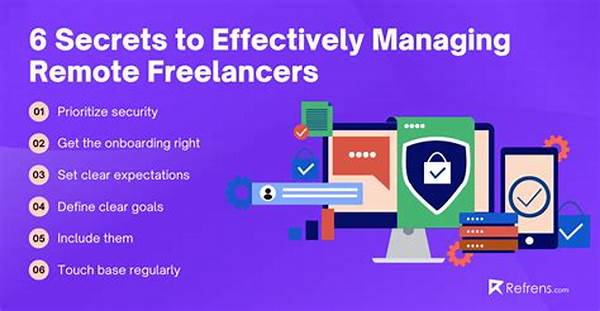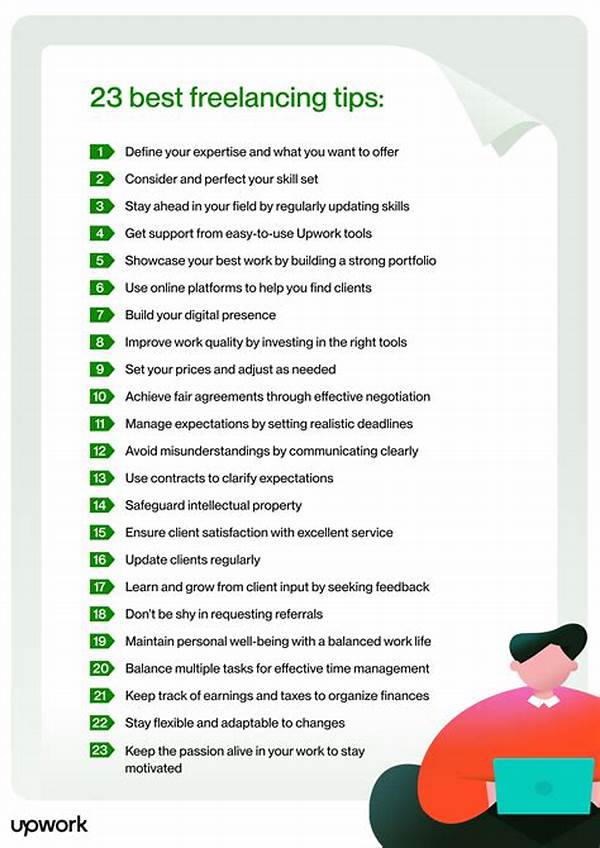
How Remote Freelancers Manage Their Finances
Read More : Best Platforms For Remote Freelance Work In 2025
In the ever-evolving gig economy, remote freelancers are carving out their paths, often combining passion with the pursuit of financial stability. As thrilling as freelancing sounds—working from the comfort of your cozy nook, setting your hours—there is an underlying layer of responsibility that comes with being one’s boss: managing finances effectively. For those who relish the autonomy that freelancing offers, understanding how remote freelancers manage their finances is crucial to sustaining and growing their business endeavors.
The freedom to manage your finances as a remote freelancer is both exhilarating and daunting. With no steady paycheck to rely on, freelancers must become proficient at forecasting income, setting budgets, and saving for those rainy days. For instance, regular employment typically offers a safety net such as health insurance or retirement benefits, but freelancers often need to create these aspects independently. Some creative strategies that remote freelancers employ include using apps, spreadsheets, and professional finance services—not only to track expenses and receipts but also to allocate funds for taxes and personal savings. Additionally, how remote freelancers manage their finances can significantly shift their success trajectory, turning challenges into opportunities for financial growth and personal development.
Engaging in financial education is another effective measure taken by freelancers. Learning about taxes, understanding the importance of maintaining an emergency fund, and staying informed about fluctuating market rates are parts of the puzzle. But here’s the kicker: it’s not just about surviving—how remote freelancers manage their finances could mean thriving. With insightful business practice, freelancers set the stage for expansion, future investments, and a comfortable lifestyle that transcends the ordinary nine-to-five mold.
Budgeting Tools and Strategies
At the core of managing finances effectively as a remote freelancer lies budgeting. Crafting a budget is like creating a roadmap for financial travel. Many freelancers utilize digital tools such as budget apps or dedicated finance software to track spending and income. After interviews with seasoned freelancers, it becomes apparent that while initial efforts may feel overwhelming, consistency and routine can transform financial management into a smooth sailing venture.
By automating invoices and timing them with expected receipt dates, freelancers ensure a more regular flow of income. These practices aid in reducing stress and afford more time to focus on core business activities. It’s a tale as old as time—where there’s a will, there’s a way. The strategic approach to finances, tailored uniquely to each freelancing individual or company, exemplifies how remote freelancers manage their finances with finesse, poise, and adaptability.
Understanding Freelancers’ Financial Challenges
The financial landscape for freelancers differs significantly from that of traditional employees. Freelancers face unique challenges such as fluctuating income, unpredictable workload, and the lack of conventional employee benefits. Concerning money management among freelancers, the need for meticulous planning cannot be overstated. Unlike salaried employees, freelancers must be proactive in setting aside funds for tax payments, often required on a quarterly basis in many jurisdictions. By doing so, they avoid unintended financial pitfalls.
Moreover, freelancers tuck away a portion of their income as savings, providing a buffer during low-earning periods. This emergency fund offers peace of mind when projects are scarce and ensures they don’t need to compromise on client work out of financial desperation. For freelancers, understanding these financial intricacies and preparing for unexpected expenses represents the foundational steps in how remote freelancers manage their finances effectively.
Strategies for Financial Peace of Mind
Freelancers tend to employ a mosaic of strategies designed to achieve financial security. Firstly, diversifying income sources is a common tactic. This not only spreads risk but also potentially elevates earnings. Taking up various projects ensures that they are not solely reliant on a single client. Additionally, freelancers often invest time in professional development, enhancing their skills and broadening their service offerings, thereby increasing their market value.
Secondly, implementing robust invoicing systems ensures timely payments and reduces cash flow interruptions. Automating these systems not only simplifies the process but contributes to the freelancer’s overall efficiency. Meanwhile, continuous learning and adaptation to new financial tools can enhance their ability to manage finances, reflecting how remote freelancers manage their finances through innovation and persistent effort.
Research-Backed Financial Insights
Recent research sheds light on the financial behaviors of successful freelancers. An analysis of freelancers’ financial habits reveals a distinct pattern of behavior—prioritized budgeting, emergency savings allocation, investment in self-improvement, and the embrace of digital financial tools. Interviews with prominent freelancers and financial consultants alike emphasize the importance of early planning and financial literacy.
Statistical data highlight that freelancers maintaining a diverse set of income streams exhibit higher financial stability. Efficient freelancers often create and stick to a stringent financial plan that accounts for every penny. As remote freelancers continue to grow in number, understanding these patterns showcases the essentials of how remote freelancers manage their finances, steering their businesses toward sustainable success.
Eight Key Tips to Manage Freelance Finances
Establishing a comprehensive budget is crucial in monitoring income and expenditure, aiding in better financial decisions.
Freelancers should allocate a percentage of every payment to avoid panic during tax season.
Ensure income stability by working on varied projects and with multiple clients.
Improve cash flow consistency with timely invoicing and regular client reminders.
Utilize technologies and apps that streamline financial tracking and reporting.
Allocate funds for unexpected expenses, cushioning financial strain in slower times.
Enhance service offerings by expanding skillsets, remaining competitive in the freelance market.
Leverage services from financial advisors to optimize tax strategies and investment opportunities.
Managing Fluctuating Freelance Income
The unpredictable nature of freelance income can be mitigated through strategic financial planning. Establishing a cash reserve, or buffer, is a wise practice that freelancers can adopt. This reserve acts as a safeguard against months when work might not be as plentiful, allowing the freelancer to continue meeting essential expenses without immediate worry.
By embracing a proactive approach and continuously revisiting their financial plans, freelancers are better prepared for fluctuations. A detailed examination of previous income patterns and careful projection of future earnings form the backbone of financial stability. Such measures illustrate how remote freelancers manage their finances with foresight and precision.
Lifestyle and Finance for Freelancers
The blend of freelance work and lifestyle choices significantly impacts financial health. Many freelancers today are opting for a minimalist lifestyle, consciously restraining excessive spending. By doing so, they not only align their living expenses with fluctuating income but also contribute positively to their financial future.
Adopting a minimalistic lifestyle can lead to better allocation of financial resources towards growth-oriented avenues like investments and savings. These choices highlight the intrinsic link between lifestyle decisions and financial management, providing valuable lessons in optimizing how remote freelancers manage their finances for a sustainable future.
In conclusion, the art of managing finances as a remote freelancer is a multifaceted endeavor combining meticulous budgeting, strategic planning, and adaptive approaches. By embracing financial literacy and leveraging available tools and strategies, freelancers across the globe master the intricate dance of monetary management, ensuring a stable and prosperous freelance career.


